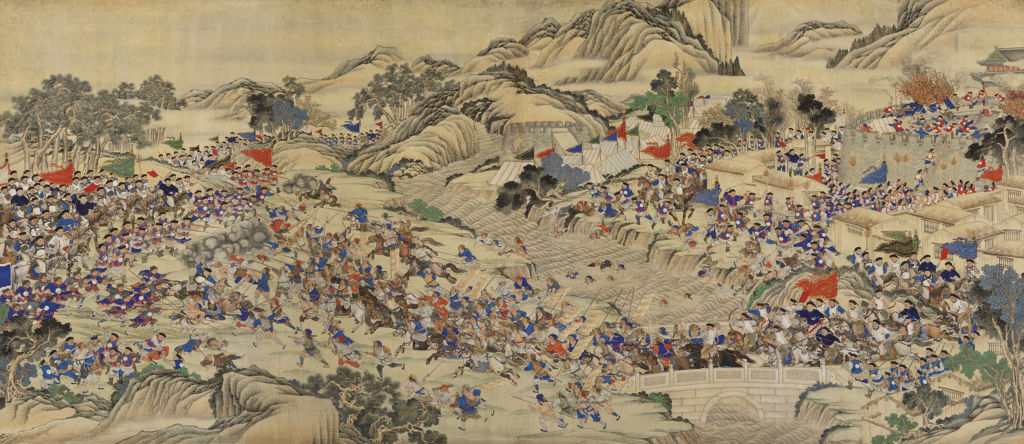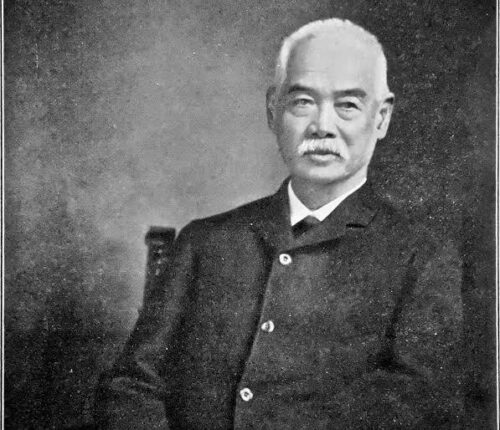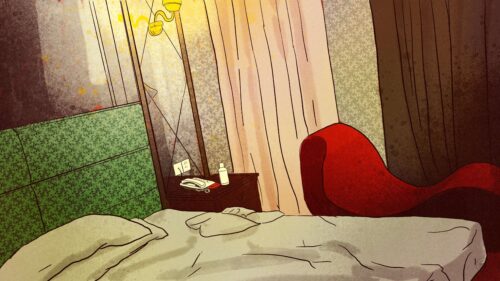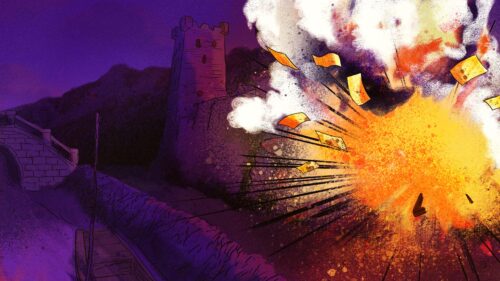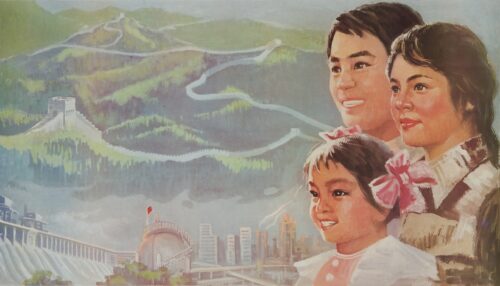This Week in China’s History: June 10, 1852
Jonathan Spence, one of the most prominent historians of China to write in English and also one of the main chroniclers of the Taiping Rebellion, once grouped historical phenomena into three categories. The first comprised events that were “logical and predictable.” The second category included events that he called “unexpected, but explicable once the premises were understood.” Finally, for when things really got weird, Spence suggested a third category: “the deeply bizarre.”
How a Chinese man came to see himself as Jesus Christ’s younger brother, charged to wage a holy war against Manchu demons by his father, the Christian God, and accompanied by the Holy Ghost was, indeed, deeply bizarre.
~
The mountains of Hunan and Guangxi are not terribly high — the tallest, Kitten Peak, tops out around 7,000 feet — but they are rugged. By early June, the brutal summer has already set in, bringing temperatures in the 90s and humidity to match. It was in these unforgiving conditions, in 1852, that militia soldiers fought for the Qing dynasty against its most potent rebellion, the Taiping.
The Qing dynasty had ruled China for 200 years from its seat of power in Beijing. As was the case throughout much of China’s history, the dynastic grip on power ebbed and flowed through distant and disparate territories and relied on allegiances and cooperation with private militias, regional power holders, and other ad hoc administrative solutions.
And so it was that on June 10 or 11 of that year, militia leader Jiāng Zhōngyuán 江忠源, fighting for the ruling Qing, set an ambush, blocking the Xiang River with iron bars and logs. Jiang’s army lay in wait for more than 20,000 Taiping fighters sailing swiftly down the river, abandoning their failed siege of Guilin in favor of their next target, the city of Changsha, in central China’s Hunan Province.
The Taiping boats foundered on Jiang’s barricade and found themselves under attack by gunfire and flaming arrows. Ten thousand Taiping soldiers died, and the revolt might have been wiped out completely if Jiang’s subordinates had carried out their instructions to attack from the river’s opposite bank. Avoiding annihilation at the Suoyi Ford, the Taiping regrouped and recovered behind their leader, Hóng Xiùquán 洪秀全 — 38 years old in 1852, the would-be ruler of China, and the self-proclaimed younger brother of Jesus Christ.
~
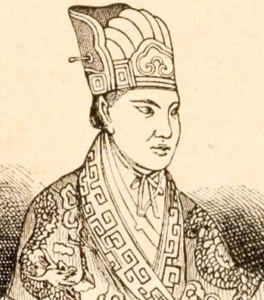
It didn’t begin that way. Hong Xiuquan was born near Guangzhou in 1814. He was a Hakka, an ethnic minority with distinct cultural practices and its own language (Hakka) but that is generally seen in China as a subgroup of the predominant Han Chinese majority rather than its own ethnic group.
Hong’s early life was unremarkable. When he was around 20 years old, he sat for the regional civil service exam in Guangzhou, and failed. Undeterred, he returned a year or two later. He failed again. In 1837, Hong made his way to Guangzhou to take the exams for the third time. And he failed the exams for a third time.
All of this falls into Spence’s “logical and predictable” category. The civil service in China, often revered as a meritocratic path to government power, was, by the 19th century, neither meritocratic nor a reliable path to power. Studying for the exams needed time and money, limiting access to this ladder of success. Moreover, the size of the government had not expanded along with China’s population, meaning that while the pool of applicants was steadily growing, the available positions were not. Only about 1% of test takers in Hong Xiuquan’s class would have been expected to pass.
Of the millions who failed the official exams, only one, as far as we know, ever envisioned himself a son of God and led a rebellion. Here is where Hong’s predictable path takes the turn that will eventually take him to millenarian revolt. On one of his visits to Guangzhou to take the exams, a Chinese Christian named Liáng Āfā 梁阿发 handed Hong a pamphlet, “Good Works for Exhorting the Age.” It seems that Hong did not read the pamphlet right away, but he held onto it.
Being proselytized by a Chinese Christian seems odd, and it was certainly not typical, but looking a little closer, Hong’s experience makes sense. Guangzhou (then called Canton in English) was the only place in China where foreigners were allowed to trade at the time, and although spreading Christianity was illegal, intrepid missionaries had made their way to the coast and begun making converts, including the one who reached out to Hong Xiuquan.
Hong took his third failure of the civil service exam hard. He broke down — maybe from nervous exhaustion — and in a fitful, fevered state, he dreamed of demons and deities, and a bearded father figure who sent him on a heroic mission to liberate his people from oppression. Once he recovered, he returned home to teach school and to prepare for his exams once again. In 1843, he went back to Canton, failed the exams for a fourth time, and, for reasons we cannot know, finally read the Christian tract he had been given years before.
The text gave Hong the clues to make sense of his dream from years before — or maybe it was the other way around.
The demons of his dream were the Manchus, the ethnic group from the northeast of the continent who had ruled China since 1644. The bearded figure commanding Hong to cleanse China of these demons was none other than the Christian God. Hong’s older brother, Jesus Christ, had armed Hong for his battles to come with a sacred sword.
It was not failing the exams, having a vivid dream, or encountering Christianity that made Hong Xiuquan’s life unusual, but connecting all of these in ways that led him to conclude he was the younger brother of Jesus took Hong from “predictable” to “explainable” to “bizarre.”
Hong Xiuquan followed the instructions of his dream father and set out for the mountains of Guangxi, where he joined a small community of “God Worshippers.” A charismatic speaker, Hong soon became the leader of the group, and not only attracted followers to the “Society of God Worshippers,” but instituted a social program that included segregating the sexes, prohibiting gambling, prostitution, and opium use, and collecting wealth in a central treasury to be used for the good of the entire society.
Hong’s movement grew quickly in the mountains of Guangxi. Tens of thousands had joined the movement by the time it gained the attention of Qing armies, who soon discovered the potency of the Taiping threat. By January 1851, Hong had declared his movement a new state: the Heavenly Kingdom of Great Peace (太平天国 tàipíng tiānguó).
It was these Taiping armies that began the campaign that brought them to Guilin and then their near-destruction at the Suoyi Ford in June 1852. That defeat was one of several setbacks that threatened the movement in the spring and summer of 1852, but by that autumn, Hong’s forces regained their momentum, taking the cities of Yuezhou, Hankou, Changsha, and finally Nanjing, which they made their capital in March 1853.
With Hong Xiuquan sitting on his throne, Westerners — now established at their new treaty port in Shanghai — responded with curiosity to rumors that Hong might bring a Christian China, a dream many had long harbored. But their initial optimism faded when visitors to Hong’s court in Nanjing reported Hong’s unorthodox theology: not only did he claim to be Jesus’s brother, but his leadership included the Holy Ghost, and he spoke of visions of an extended Holy Family with wives and siblings unnamed in the Bible.
Despite his unorthodox beliefs, Hong’s power was undeniable. The Taiping at its peak controlled almost a third of China’s heartland, and seemed poised to topple the Qing dynasty. It was a novel coalition of Confucian gentry, regional militia, Western armaments, and squabbling within the Taiping ranks that enabled the Qing to stave off this threat, though not before wide swathes of China were laid waste. Historian Tobie Meyer-Fong has shown how many cities took decades to recover, and some never did. The Taiping Rebellion killed as many as 30 million people. (By contrast, the U.S. Civil War, happening at the same time, killed fewer than 1 million.)
How differently might the Qing have played out if the Taiping had ended — as it nearly did — at the Suoyi Ford, 168 years ago this week? It’s drawing too straight a line to say that the Taiping led to the fall of the Qing, but the rebellion certainly shaped its last several decades. The Taiping Rebellion set in motion or accelerated dynamics that dogged the Qing until its end in 1912. Power devolved from the center toward regional authorities who were marshaling resources to fight the rebellion. Perhaps if the Taiping had been snuffed out in its early stages, that process might have slowed, enabling the central government to recover and stabilize.
The Taiping Rebellionalso enhanced European and American influence in China. Counterintuitively, the British came to invest in ensuring that the Qing did not fall, as they worried about challenges to their global trading empire in both the United States and India, where civil war threatened the cotton supply to British mills. With both North America and India unstable, Britain would become invested in stabilizing China for its own benefit. If the Qing had not come so close to collapse, Britain might not have invested so quickly and deeply.
Finally, the autonomy of Shanghai owes much to the Taiping threat. If the rebellion had ended in 1852, Taiping soldiers would never have threatened Shanghai, and Europeans living there might not have come together to expand their autonomy from the Qing. And with the Qing itself freed from fighting against God’s Chinese son, it seems plausible that Britain’s colonial enterprise on the China coast could have been drastically curtailed.
Food for thought as one contemplates what was and what might have been in the muggy mountains of Guangxi in June 1852.
This Week in China’s History is a recurring column on The China Project: Each week, James Carter, Professor of History at Saint Joseph’s University in Philadelphia, will look back to one event from China’s past. Last week:
Remembering to remember, or learning to forget?: China’s relationship with Tiananmen 31 years on
